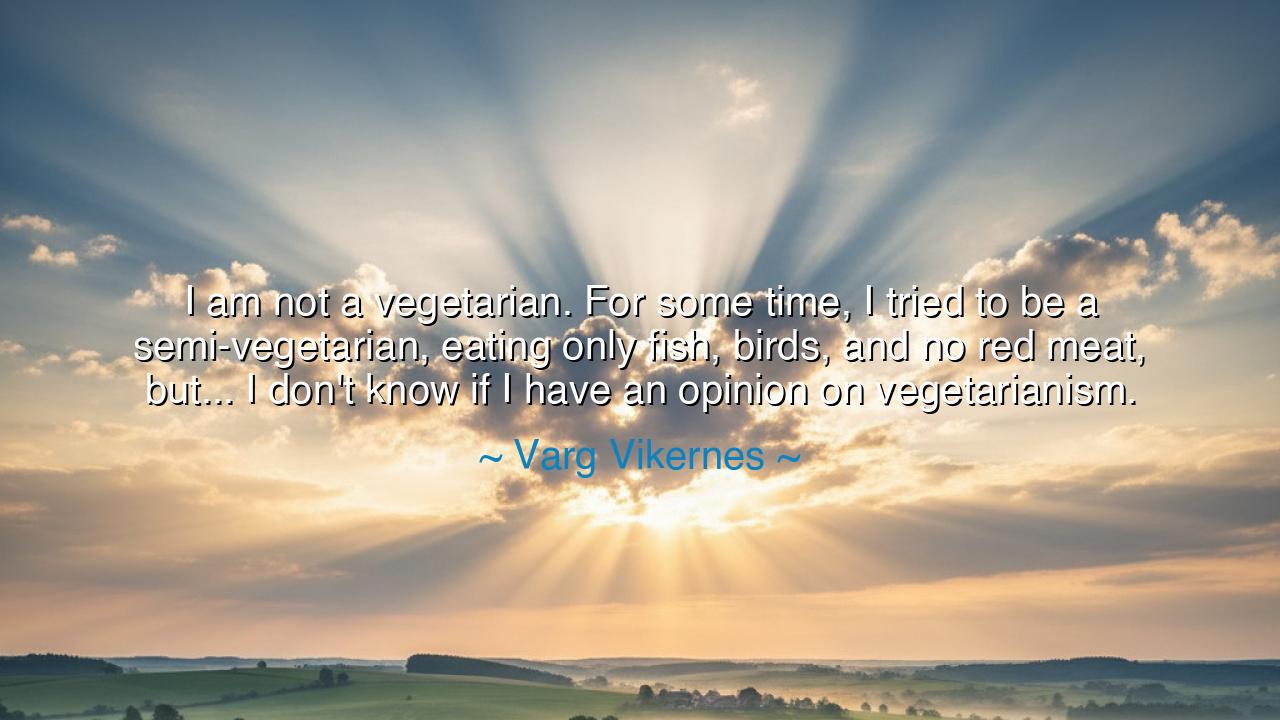
I am not a vegetarian. For some time, I tried to be a
I am not a vegetarian. For some time, I tried to be a semi-vegetarian, eating only fish, birds, and no red meat, but... I don't know if I have an opinion on vegetarianism.






Varg Vikernes, a figure both controversial and enigmatic, once confessed with disarming honesty: “I am not a vegetarian. For some time, I tried to be a semi-vegetarian, eating only fish, birds, and no red meat, but... I don’t know if I have an opinion on vegetarianism.” Though the words seem casual, even uncertain, they carry within them a deeper reflection on the nature of choice, conviction, and the struggle between ideals and reality. In this wavering, we see not weakness, but the profound truth that not every path is clear, and not every decision is bound in certainty.
The meaning of his statement lies in the tension between aspiration and practicality. Many who hear of vegetarianism are drawn to its moral, spiritual, or healthful appeal. Yet, as Vikernes admits, adopting such a way of life is not merely about ideas but about endurance, habit, and inner alignment. His attempt at being semi-vegetarian reflects a common human experience: the effort to move toward a higher principle, yet the difficulty of remaining steadfast when confronted with the weight of daily life. His lack of a firm opinion underscores that not all journeys of conscience end in certainty; some remain unresolved, and this too is part of the human story.
History gives us many examples of this struggle. Consider Leo Tolstoy, the great Russian novelist, who late in life adopted vegetarianism as part of his moral awakening. For Tolstoy, abstaining from meat was not only about diet but about nonviolence, compassion, and a rejection of cruelty. Yet even he admitted that the path was fraught with difficulty, that the habits of the body often clashed with the ideals of the spirit. Unlike Vikernes, Tolstoy clung to conviction, but the struggle they both describe is the same: the battle between desire and discipline.
In contrast, we may recall Winston Churchill, who never sought to cloak his appetites in moral struggle. He once remarked that he believed man should eat meat, drink wine, and smoke cigars, for such was the joy of life. Where Tolstoy saw ethical duty, Churchill saw indulgent freedom. Vikernes’ wavering position stands between these poles—neither fully abstinent nor fully indulgent—symbolizing the middle place where many of us reside, unsure of where we stand, and yet still wrestling with the question.
The lesson here is not to scorn uncertainty but to honor it. To admit, as Vikernes does, that one does not fully know, is itself a kind of wisdom. Too often people claim absolute certainty in matters they barely understand. But honesty about our own lack of clarity allows us to continue learning. The attempt to live by principle, even if it falters, is nobler than never attempting at all. And sometimes, the journey through indecision leads us closer to truth than rigid certainty ever could.
In practice, this means allowing yourself the space to explore convictions without forcing yourself into hypocrisy. If you feel drawn to vegetarianism, test it, learn from it, and honor what it reveals to you about yourself. If you cannot follow it perfectly, admit it without shame. If you remain uncertain, use that uncertainty to stay open, to listen, and to grow. Convictions that endure are forged in honesty, not pretense.
Therefore, children of tomorrow, remember Vikernes’ words: not every struggle of principle ends in clarity, but even the attempt is meaningful. You need not always have a final opinion, for life is not always about final answers but about the integrity with which you wrestle with your questions. Let your journey be marked not by pretending to know, but by the courage to admit when you do not. For it is in this humility that wisdom often begins.






AAdministratorAdministrator
Welcome, honored guests. Please leave a comment, we will respond soon